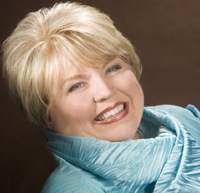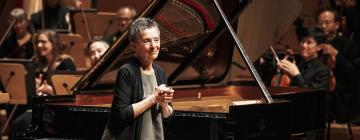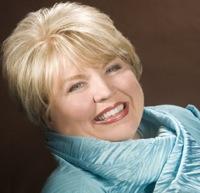
Carlson was speaking about the genesis of Promise, commissioned by Kathryn Gould’s Magnum Opus joint project for the Marin, Santa Rosa, and Oakland East Bay symphonies. “It was one of the first to be commissioned and will be one of the last to be performed, the only vocal one; all the rest are orchestral. I was going to do it that way — and then there was Christine in Saint Louis three years ago, saying she loved my opera. I found out later she had worked with Alasdair Neale at Sun Valley [Idaho], thought about the commission, about having a great dramatic soprano with a big orchestra, how everybody knew each other — and thought, ‘Now wouldn’t that be nice ...’”
Carlson met Brewer in Saint Louis, where she lives, after a mutual friend had suggested she see the composer’s Anna Karenina at the Opera there. “I’d never met her before; I love her voice,” Carlson recalled, remembering that Brewer said of his opera, “I could sing that music.” And so began the project of composing a song cycle, inspired not only by Brewer’s voice, but also by her life. Carlson in turn commissioned his old friend the poet Susan Kinsolving, with whom he’d collaborated on a cantata, Constellations, composed for a chamber orchestra, vocal soloists, nine strings, and a harp, to celebrate Glimmerglass’ 25th anniversary in 2000.
Kinsolving, author of three previously published books of poetry and the forthcoming My Glass Eye, poet in residence at the Hotchkiss School in Connecticut and founder of the graduate writing seminars at Bennington College in Vermont, spoke of her long friendship with David Carlson, whom she met “when we were both graduate students at the California Institute for the Arts ... I’d come back after late nights in L.A. and see that David’s lights were always on. I asked him later what kept him up so late, and he said very casually, ‘I’m writing a symphony ...’ We remained friends, always interested in what the other was doing — such an affinity; music and poetry.”
More About Christine Brewer
Of the inspiration for the piece in Brewer’s life and musical calling, Kinsolving said, “It’s not to be autobiographical, but more of affinity with her persona, with something of her triumph. I wrote lyrically more than as a narrative — with, I hope, some sense of transcendence, as a poem has: metaphor taking one meaning and showing its transformation into another. Blending of an abstract with a specific. I’ve only heard the poem in my head — and I’ve not yet met her. But, in my reading about her, I just liked her, intuitively. I was deeply impressed with the grandeur of her spirit, her optimism, determination. I think she’s a very spontaneous and very spiritual person.” The three songs are described as “spanning the arch of a life,” with images of that life.
Carlson mentioned a specific inspiration: Brewer growing up on a farm, and the innocence of that setting. Carlson also commented on the program and his own music in relation to it. “Two Americans and a German! It’s funny; a lot of composers want to sound American, like Copland or Bernstein sound American. I don’t feel that, although I guess my music sounds American to a European. I like the individual voice. In terms of subject matter and form, I try to do something each time that I haven’t before. A fantasy opera, then one about the Ute Indians for the centennial of Utah — then Anna Karenina!” The Promise of Time he described as “not completely un-Wagnerian. Long contrapuntal, lyrical lines, chromatic ...” He recalled a teacher of his at Cal Arts, a Schoenberg student, admonishing his classes that “the point of 12-tone music was not to make it sound tonal! But I thought it was fun. I grew up with the avant-garde, and now don’t use it.”
Barber’s Essay for Orchestra, the second of three in a form that was his own creation — which has been described as “a musical argument ... a metaphor for handling musical themes,” in which a melody, “the thesis,” gives rise to the major themes — was finished in 1942, after the attack on Pearl Harbor, Barber commenting that, while it “has no program, one perhaps hears it was written in wartime.” This performance of the work, honoring the centennial of his birth, will be conducted by guest assistant conductor Edward Abrams, whom Alasdair Neale mentioned he’d known since Abrams was 10, a clarinetist with the San Francisco Youth Orchestra, which Neale directed. “It’s rather unusual, but in Marin we make an effort to bring in young, talented artists; why not extend that to conductors?”
Of the ambitious program for this concert, Neale spoke of “a lot of serendipity — four people involved in its creation, and we all know at least one of the others. David Carlson and I have had a friendship for over 20 years. I worked with Christine in Sun Valley — and, lo and behold, she went to Anna Karenina in Saint Louis, met David, and he put two and two together.
“We’ll have an American first half, then Wagner. Various links between the lives of the people involved run through it. I can just imagine the sound Christine will make with her voluptuous voice, floating these wonderful phrases over the orchestra. I feel very satisfied, making music this way, with friends and colleagues.”
Carlson and Kinsolving will speak with Neale at the preconcert talks, 6:30 p.m., before each performance.
